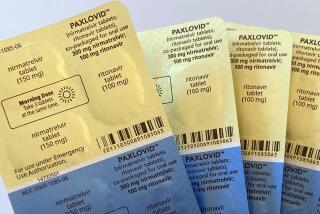Side Effects Often Negate AZT’s Benefits, Study Finds
- Share via
The slight benefits of taking AZT, the commonly used AIDS medicine, are often canceled by the drug’s side effects, a study concludes.
The report casts even more doubt on the routine use of the medicine, which is often given to people who are infected with HIV, the virus that causes AIDS, but who are not yet ill.
Studies last year showed that, contrary to widespread belief, this use of AZT does not help people live longer, even though it modestly delays the start of AIDS symptoms. The latest work suggests that people may get so sick from the medicine that this offsets any health advantage of postponing the onset of AIDS.
“There is a trade-off between the benefit of a prolonged disease-free state and the quality of life decrement caused by side effects related to treatment,” said Dr. William R. Lenderking, a psychologist at Harvard School of Public Health.
Lenderking’s study, based on 1,338 HIV-positive people, was published in today’s New England Journal of Medicine.
The patients had low levels of the variety of white blood cell that is the primary target of HIV, but they were outwardly well. They were randomly assigned to take AZT or placebos and studied for 18 months.
The AZT patients survived an average of 15.6 months without severe side effects or AIDS symptoms, compared with 15.7 months in the untreated comparison group.
Severe symptoms of AZT treatment included prolonged nausea, vomiting and fatigue.
At Burroughs Wellcome, which makes AZT, Dr. James Rooney said the study does not mean physicians should abandon early treatment with the drug.
“It comes down to patient choice whether they prefer to have toxicity or disease progression first,” he said.
A separate report in the journal suggests that blacks are less likely than whites to receive AZT before AIDS symptoms occur.
The reasons for the difference were unclear, but the researcher concluded that “culturally appropriate efforts” to encourage blacks to get treatment may be needed.





